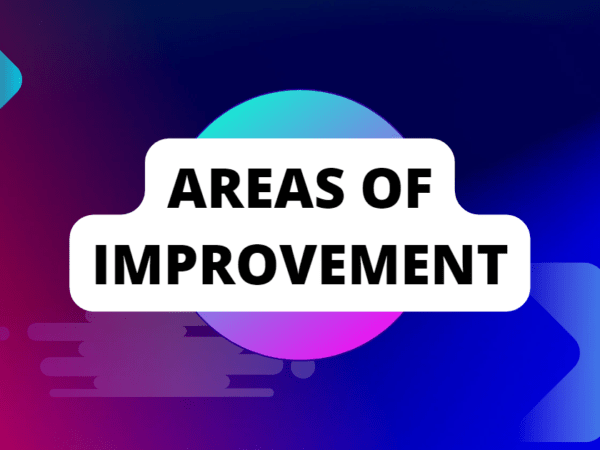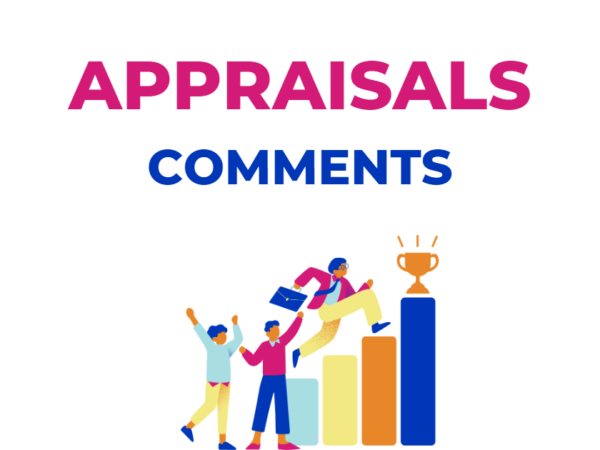Appraisal Comments for ‘Goal Setting’

Goal Setting
Goal setting is essential because it gives your work direction and focuses. It’s difficult to know what you’re working towards if you don’t have clear goals, and it’s easy to become distracted or overwhelmed. Setting goals allows you to prioritize your work, focus on what matters most, and accomplish more in less time.
Goals also serve as a measuring stick for your progress. Setting specific, measurable goals allows you to track your progress and see how far you’ve come. This is necessary for performance appraisals because it allows your employer to see how you performed over a specific time period and determine whether you met your goals.
Also Read: Top 10 Email Templates for Various Situations

How to Set Effective Goals for Your Appraisal?
It is critical to ensure that your appraisal goals are effective when setting them. Specific, measurable, achievable, relevant, and time-bound goals are effective.
Here’s how to make effective appraisal goals:
| 1. Be Specific | Set clear and precise goals that identify exactly what you are working towards. |
| 2. Make Them Measurable | Set goals that can be tracked and measured to monitor progress and determine success. |
| 3. Make Them Achievable | Set goals that are challenging, yet realistically attainable within the given timeframe. |
| 4. Ensure They’re Relevant | Set goals that are directly related to your job responsibilities and the company’s objectives. |
| 5. Make Them Time-Bound | Set goals with a specific deadline or timeframe to provide motivation and focus. |
Self-Appraisal Comments for Goal Setting
“I effectively set and prioritize goals based on their importance and relevance to organizational objectives.”
“I regularly review and revise my goals to ensure they are aligned with organizational priorities and meet changing circumstances.”
“I consistently meet or exceed my established goals, demonstrating a commitment to achieving success.”
“I seek feedback on my goals from managers and colleagues, using this information to improve and refine my approach.”
“I take initiative in setting challenging but achievable goals, pushing myself to reach my full potential.”
“I communicate my goals clearly and effectively to others, promoting collaboration and alignment towards shared objectives.”
“I track and measure progress towards my goals, using data and metrics to evaluate my performance.”
“I effectively manage my time and resources to ensure I have the necessary resources to achieve my goals.”
“I prioritize my goals based on their level of importance and urgency, ensuring I am focused on the most critical tasks.”
“I take responsibility for my own goal setting and actively seek opportunities for self-improvement and development.”
“I am open to feedback on my goals and actively seek input from others on how to improve and refine my approach.”
“I am proactive in identifying and addressing any obstacles or challenges that may impact my ability to achieve my goals.”
“I am committed to continuous learning and development, seeking out opportunities to improve my goal-setting skills.”
“I seek out resources and support to help me achieve my goals, including training, mentorship, and coaching.”
“I am adaptable and flexible in my approach to goal setting, recognizing the need to adjust my approach based on changing circumstances.”
“I effectively prioritize and manage competing goals, ensuring that I am focused on the most important tasks.”
“I regularly assess and adjust my goals to ensure they remain relevant and aligned with organizational objectives.”
“I consistently deliver high-quality results that meet or exceed expectations, demonstrating a commitment to excellence.”
“I am proactive in identifying and addressing potential roadblocks or challenges that may impact my ability to achieve my goals.”
“I am accountable for the outcomes of my goal-setting efforts, taking ownership of any mistakes or failures.”
“I am results-oriented and focused on achieving measurable outcomes that contribute to organizational success.”
“I effectively communicate my progress towards my goals to others, promoting transparency and accountability.”
“I am proactive in seeking out feedback and input from others on my goal-setting efforts.”
“I seek out new and innovative approaches to goal setting, looking for ways to improve and refine my approach.”
“I am committed to continuous improvement and growth, recognizing the importance of ongoing learning and development.”
“I effectively prioritize and manage my workload to ensure I have the necessary time and resources to achieve my goals.”
“I am proactive in seeking out opportunities to collaborate with others towards shared goals and objectives.”
“I am committed to achieving my goals in a way that aligns with organizational values and ethics.”
“I take a strategic and long-term view towards goal setting, looking beyond short-term wins to achieve sustainable success.”
“I seek out opportunities to celebrate and recognize my achievements and those of others, promoting a positive and supportive team culture.”
“I am accountable for the outcomes of my goal-setting efforts, taking ownership of any mistakes or failures.”
“I am proactive in identifying and addressing potential roadblocks or challenges that may impact my ability to achieve my goals.”
“I am results-oriented and focused on achieving measurable outcomes that contribute to organizational success.”
“I effectively communicate my progress towards my goals to others, promoting transparency and accountability.”
“I seek out new and innovative approaches to goal setting, looking for ways to improve and refine my approach.”
“I am committed to continuous improvement and growth, recognizing the importance of ongoing learning and development.”
“I effectively prioritize and manage my workload to ensure I have the necessary time and resources to achieve my goals.”
“I am proactive in seeking out opportunities to collaborate with others towards shared goals and objectives.”
“I am committed to achieving my goals in a way that aligns with organizational values and ethics.”
“I take a strategic and long-term view towards goal setting, looking beyond short-term wins to achieve sustainable success.”
“I seek out opportunities to celebrate and recognize my achievements and those of others, promoting a positive and supportive team culture.”
“I regularly seek feedback on my goal-setting efforts, using this information to improve and refine my approach.”
“I am open to constructive criticism and use it to grow and improve my goal-setting skills.”
“I am committed to ongoing self-reflection and self-assessment, using this information to continually improve my approach to goal setting.”
“I effectively prioritize my goals based on their level of importance and urgency, ensuring I am focused on the most critical tasks.”
“I seek out opportunities to collaborate and communicate with others towards shared goals, promoting a culture of teamwork and collaboration.”
“I am committed to continuous improvement and growth, recognizing the importance of ongoing learning and development in achieving my goals.”
Goal setting is a crucial part of performance management and can have a significant impact on employee engagement, motivation, and overall success. You can set and achieve effective goals that will help you succeed in your appraisal and beyond by following the tips and strategies outlined in this blog post. Remember to stay focused, and motivated, and to celebrate your accomplishments along the way!







